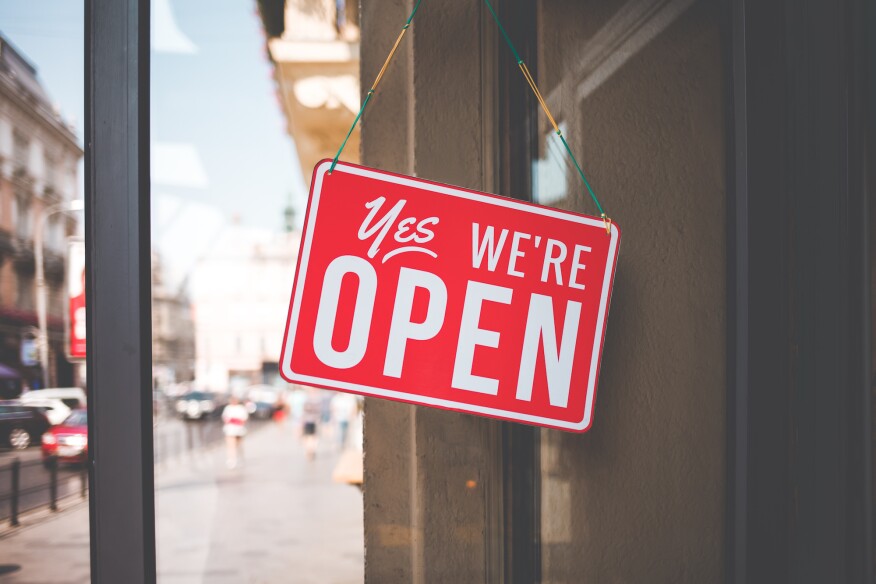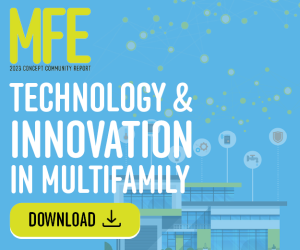
As states begin reopening in phases after stay-at-home orders blanketed the nation due to the COVID-19 pandemic, apartment owners and operators are heeding guidance, prioritizing communication, and making decisions based on the market.
“To say there’s no playbook for this is an understatement on so many levels,” says Mike Gomes, chief experience officer at Cortland. “I’m so proud of how the organization has reacted.”
For Cortland, which owns over 58,000 units across the U.S., there’s no one-size-fits-all approach for reopening, and the firm is being mindful of local restrictions and guidelines. It also is empowering community site and regional operations teams to be the boots on the ground to agilely react to the various needs of the markets.
“Safety continues to be paramount. It’s always the most important thing when you want a physical experience. You want your home to be safe and secure. And that now extends to the cleanliness of our properties and social distancing,” he says.
Cortland has opened all offices and pools across its portfolio and is opening fitness centers where it’s allowed.
“People are not running to fitness centers, and pools are not oversubscribed,” says Gomes. “More in-person contact is happening, but there’s still a lot of people cautiously waiting. We will continue to ease our restrictions and guidelines as state and local guidelines relax.”
He also is remaining cautious. “The pandemic isn’t behind us. It’s still out there, and any uptick and spike in COVID-19 positive cases could just as easily cause us to take two steps backward to tightening restrictions again,” he adds.
To provide residents with a peace of mind, LYND, a national apartment management company with 20,000 residential units in 11 states, is implementing a special system to disinfect and repel germs from surfaces. It will be using the BIOPROTECTUs System by ViaClean Technologies to disinfect units and common areas as well as provide a long-term antimicrobial protection from germs, including bacteria, molds, and viruses.
“The COVID pandemic was a wakeup call to sanitization,” says Chris Jett, executive vice president at LYND. “This will help us as a tool to keep everyone on every end of the spectrum safe and healthy. This is going to be the new line in the sand of what people are going to expect.”
The firm has partnered with its existing pest control company to do on-site spraying each quarter, and bar code stickers will go into units and in common areas providing the Environmental Protection Agency claims that the product makes, a countdown to the next cleaning, and how many days are left for the ability to disinfect.
“Every person running a business has been forced to become an expert on this stuff since it impacts every aspect of your business,” says CEO A. David Lynd. “This product is a game-changer for the way that human beings protect themselves against bacteria and viruses.”
Avanti Residential, which brought its over 6,000 units under in-house management a year ago, has been adapting to the reopening phases at its properties in Colorado and the Phoenix area.
Avanti Residential has a 20-page document to help on-site teams with reopening plans and its own three phases that it is following, according to Brenda Gammie, senior vice president of operations. It currently is in phase two, with phase three being back to normal, and she says Phoenix is about two to three weeks ahead of Colorado.
“I’ll be surprised if we get out of phase two by the end of summer,” she says. “I’m hopeful for the end of the year, but it depends on what kind of comeback we have going into the fall and the winter flu season.”
At this time, the property management offices and leasing tours are available by appointment only. Reduced capacity signs are in the elevators, floor markings show 6 feet for social distancing, and maintenance teams can now come in to units do repairs as long as the resident isn’t home. Hand sanitizing stations have been added at the pools, fitness centers, and leasing offices, and residents or prospective residents who come into the leasing office are asked to wear masks.
It opened its pools and fitness centers in the Phoenix area when the governor allowed it right before Memorial Day.
“We have reduced capacity by 50%,” Gammie says. “We have the social distancing signs and sent emails to residents to self-police, self-monitor, and use at their own risk. We took away any fabric cushions because they are harder to sanitize, and we have a set procedure where we disinfect three times a day.”
For The Fifield Cos., a development firm that owns and operates apartments in Chicago, Dallas, and Southern California, it has been reopening amenities and property management services as restrictions are lifted and on a case-by-case basis with municipal input and guidelines.
“We are being as thoughtful and conscious as we can be to take care of all people—residents and employees,” says chairwoman Randy Fifield. “We’re really using a wide variety of ways to bridge the gap and reopen mindfully using no-touch methods.”
When amenities had been closed under the stay-at-home orders, the real estate developer strived to keep services available for residents in other ways, such as apps for cooking, fitness, Pilates, book clubs, movie clubs, Netflix movies, and package delivery to name a few.
Firms Embrace Virtual Tours, Tech Tools
While summer is normally a peak leasing season, operators and managers agree that they have seen strong activity throughout the spring.
Gomes says Cortland saw a pickup of leasing volume and velocity in April and May. “As our offices reopen, we might see a condensing of the leasing season jammed into the back part of June and July. I think it’s anybody’s guess right now of what we may see.”
Avanti Residential, which immediately went to virtual tours at the start of stay-home-orders, had record months for April and May in leasing and occupancy, and that going into June, it has continued to be very strong, according to Gammie. In addition to virtual tours, the property management team did Zoom tours and allowed self-guided tours for prospective residents providing a code for an electronic key lock.
Fifield adds that she has seen an uptick in the desire for two-bedroom units. “People are realizing that if they’re going to be spending more time in the house, having a second bedroom as an office or for other uses is a good thing. In the past, studios and one-bedrooms used to be the most popular choice, and now it’s two-bedrooms.”
The Fifield Cos. also has embraced self-guided and virtual tours. In addition, it has been hosting virtual open houses where a prospective resident can log on to Zoom for a window of time and have a broker walk them through the unit. Other technology the firm is embracing includes touchless water faucets, keyless entries, and an independent operating system that downloads insurance and rental applications to be able to do everything from a smartphone. “That’s going to be a game-changer,” she adds. “We rarely use paper anymore.”
Lynd adds that social distancing has made people realize you don’t need a leasing agent to walk you to a unit.
The technology advancements firms made due to the stay-at-home orders have accelerated and won’t be going away any time soon.
Cortland’s Gomes says that efforts on the digital engagement side of the consumer experience started well before COVID, with a new website and new capabilities for future residents. “When the lockdowns began, all of us moved to our virtual tool sets.”
Community site teams filmed over 500 virtual tours of floor plans that were edited, set to music, and dropped on to the website. “We’ve had tens of thousands of views of those virtual tours since we put them up at the end of March. Not only is there a demand in this environment but an ongoing demand for people to understand the product virtually before they physically come to the property,” says Gomes.
Gammie says as a company, Avanti had already embraced the technology so it was an easy transition. “I think the industry as a whole will shift in how we lease apartments, tour apartments, and how we communicate with residents. It definitely will be more tech savvy.”
In addition to the technology, Gomes adds another positive that has come out of the pandemic is the collaboration between multifamily companies as well as other industries. He says he has seen companies sharing best practices and procedures as well as some guidance from firms on the West Coast who went into shutdown before many other parts of the country.
“With no playbook, I have been very impressed with the whole industry bonding together. In times like this, they are not your competitors but your colleagues,” says Gomes.










